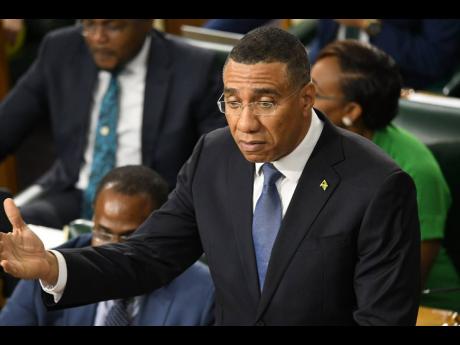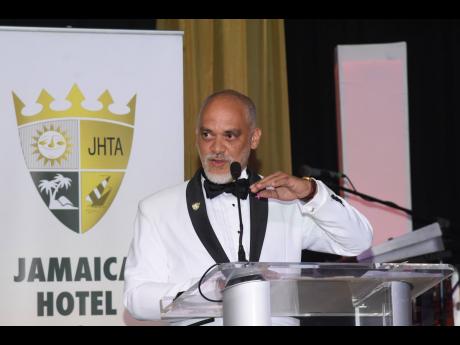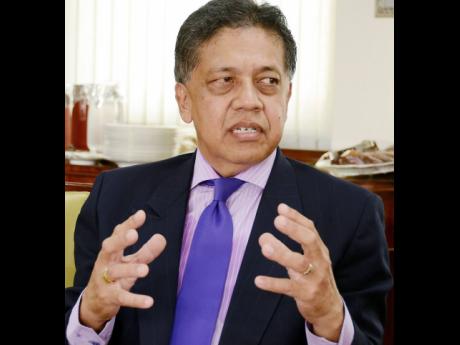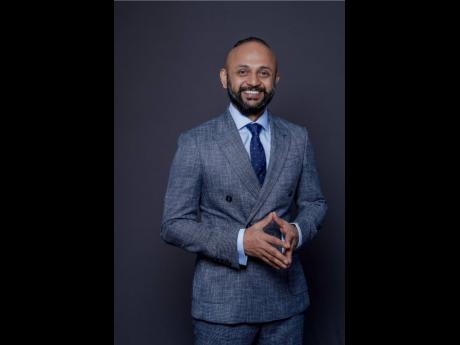Increase retirement age
Employers’ federation boss believes allowing persons to work longer will aid the country’s labour shortage crisis
With Prime Minister Andrew Holness last week once again sounding the alarm that Jamaica may have to import labour due to a shortage of skilled personnel, David Wan is calling for the retirement age to be extended. The president of the Jamaica Employers’ Federation (JEF) believes this will counter the chronic labour shortage affecting the country, which is negatively impacting the economy.
“We should think about raising the mandatory retirement age by a couple of years until we can sort out the other issues so that some of the people who have reached retirement age, and are willing to continue working can stay,” Wan told The Sunday Gleaner.
The JEF boss is also calling for the Caribbean Examinations Council (CXC) pass rate to be adjusted to 75 per cent to ensure a highly qualified workforce.
On Friday, while addressing the launch of the Jamaica National Service Corps Residential Camps for unattached youth from marginalised communities, Holness said he received a call from a local business operator who expressed an inability to find 50 workers. Without naming the company, he said the organisation indicated that it may have to source employees from overseas.
However, the prime minister said he was not inclined to import labour, but will instead target unattached youth for training through the efforts of HEART/NSTA Trust.
Some 750,000 Jamaicans are currently outside the formal labour force.
Wan said this figure consists of persons who are hustling to survive, while there are others who chose not to be in the workforce. Two hundred and eighty-eight thousand of that three-quarter million are of prime age, not in school, and are not retired, he noted.
“That idle human capacity is something that is constraining our ability to find labour as we need it,” Wan said.
According to him, there is an urgent need to find and engage retirees in order to assess their capabilities through HEART and other training agencies with a view to bringing them back into the labour force.
KNOWLEDGE-BASED ECONOMY
Anand Biradar, president of the Global Services Association of Jamaica (GSAJ) – also known as the BPO sector – which currently accounts for a 56,000-strong labour force, said finding qualified workers has become a constant struggle.
He also agrees that the retirement age should be raised, especially now that knowledge-based workers are in high demand.
“Today’s economy is knowledge-based. It is not dependent on your physical strength, so as long as mental acumen is there I will support it,” Biradar told The Sunday Gleaner.
“I have people who are 60 years old working in my company. They are sharp and fantastic. As long as they keep themselves updated with knowledge on what is going on and they catch up with the evolution, in terms of the knowledge, they can work as long as they want.”
“I feel it would be very unfair to let them retire when they can still work and contribute to the economy,” added Biradar, who admitted that struggles in the BPO sector are compounded by the length of the recruitment process and the existence of a large uneducated labour pool.
“The time taken to hire has increased. Earlier you could hire 50 people in 15 days; now it’s a month longer. The quality of the people coming in has deteriorated in terms of their educational status, but we still have to fill the need by hiring them. It takes more time for them to understand what they need to do, and their proficiency curve training is longer,” he said.
Wan wants serious consideration to now be placed on determining how to raise the pass rate of CXC’s Caribbean Secondary Education Certificate (CSEC) and Caribbean Advanced Proficiency Examination (CAPE) from 50 per cent to 75 per cent and higher over the next five years.
“We can’t do it immediately. It is a three- to five-year proposition or longer, but we need to raise the quality of the education output so that the industry has more choices and more supply of quality labour coming to them,” Wan argued.
CAN’T PAY THE BILLS
For Romaine Samuels of Negril Spot in Westmoreland, the cost of travel and other day-to-day expenses demand more than the executive employer is willing to pay.
“It takes faith and patience but my farming is better for me right now. A nine-to-five job or working in the hotel sector in today’s Jamaica does not work for me; nothing is there for the ordinary man,” he said.
Kimberly Willard, who worked in the hotel sector for 15 years prior to the COVID-19 pandemic, has no interest in going back into that industry, mainly because of the low salary she was offered over the years.
“The pay is not encouraging. I stayed that long trying to survive, but I can’t go back to cleaning rooms, and then go home and can’t buy groceries for my house,” argued Willard, who hails from Maroon Town in St James.
Robin Russell, president of the Jamaica Hotel and Tourist Association (JHTA), said the sector is now operating at 10 per cent shy of where it should be.
Russell’s diagnosis comes after hoteliers last October scrambled to find workers to serve guests who were returning to the island in droves with the easing of COVID-19 restrictions.
“I would say the hotels are in a much better place now,” the JHTA president said. “There are certain skills that we are still short on, especially in the kitchen area, which is our cooks and chefs, we need more, but overall I would say the hotels are back to about 90 per cent of where we need to be.”
He noted that the industry had a massive shortage a couple of months ago, “but I am not hearing any hotels really complaining again of a huge labour shortage”.
“Chefs take time to train. Whereas we can train a waiter or a housekeeper in six to eight weeks, a cook tends to take a lot longer than that, especially if you want a good cook at level two or three,” explained Russell, who is also managing director of Deja Resort All Inclusive on Jimmy Cliff Boulevard in Montego Bay.
He said a lot of skilled hotel workers are working overseas, where employers there have extended their contracts due to a labour shortfall also being experienced in those countries.
“When we realised that the industry was opening up quicker than we expected, a lot of initiatives were formed where HEART and Jamaica Centre for Tourism Innovation did a few six-week courses to try and get people trained and placed into the system, which really made the difference,” he added.




